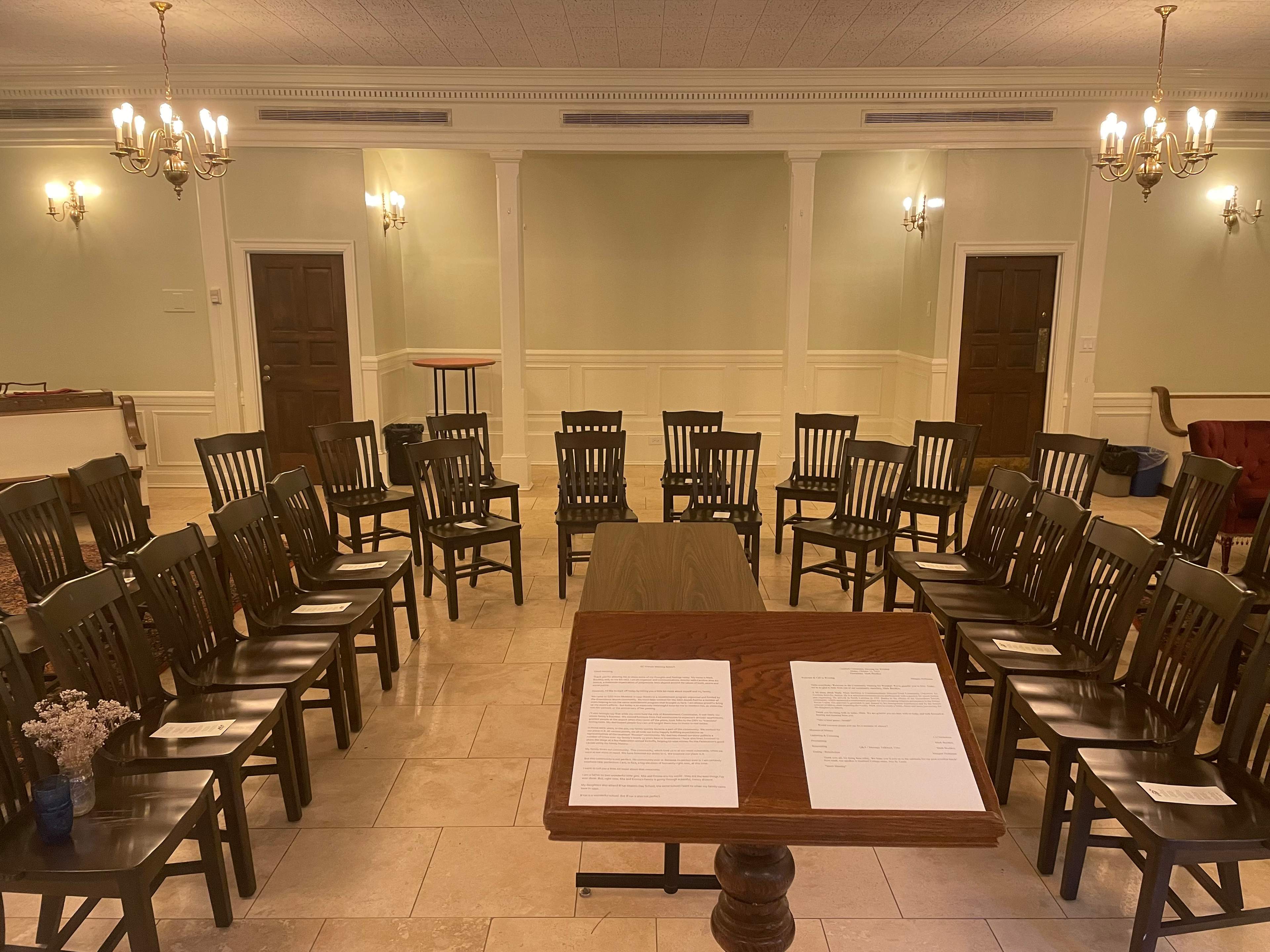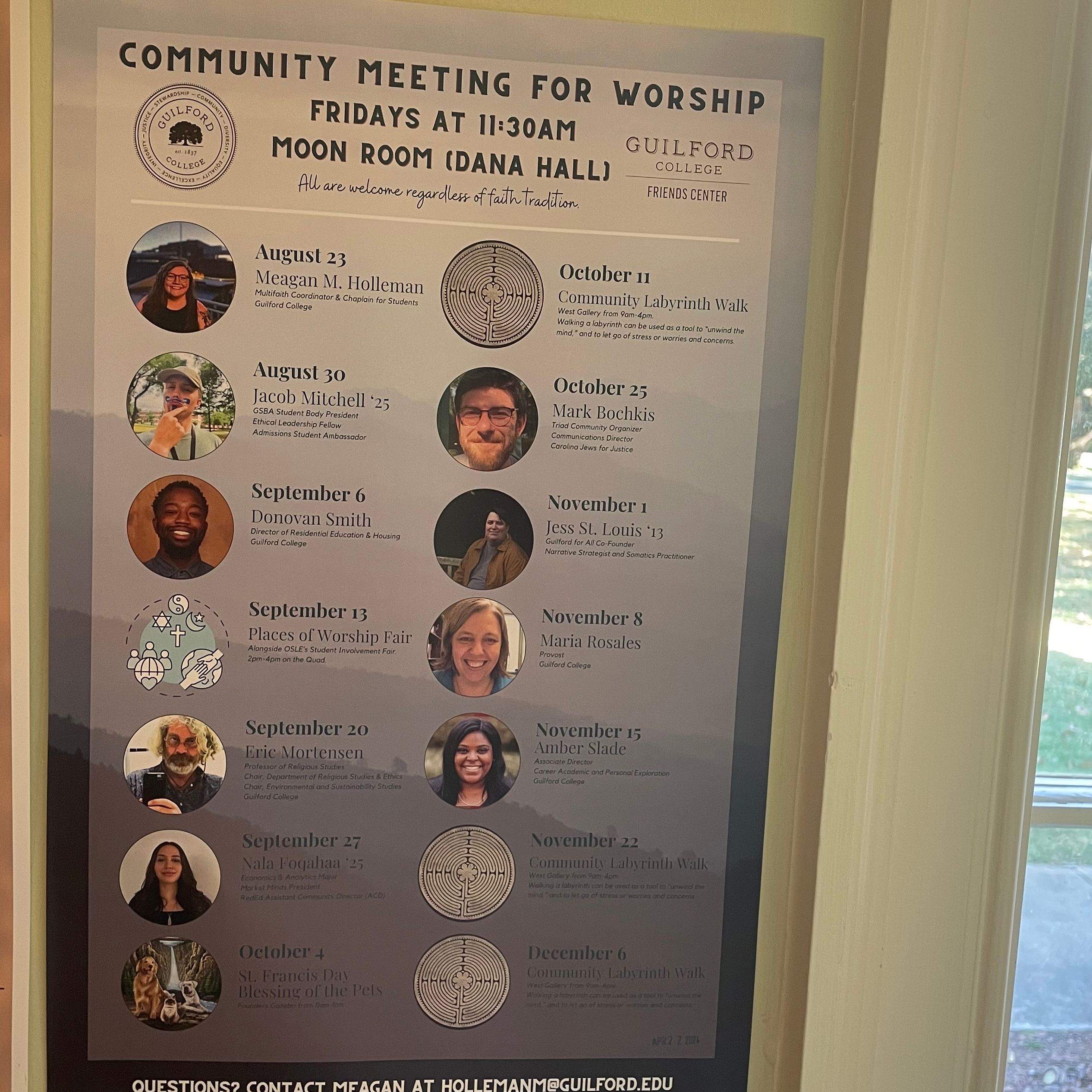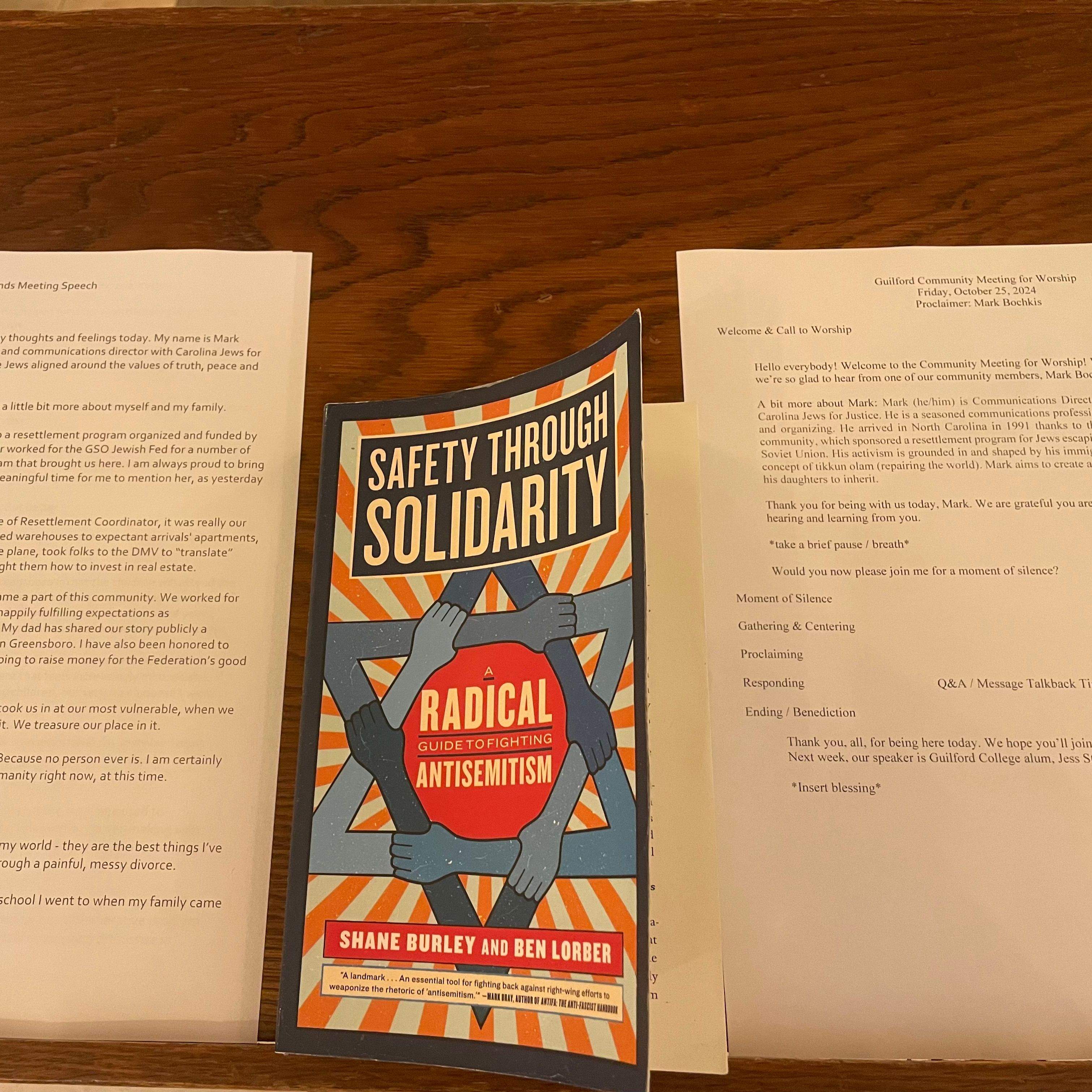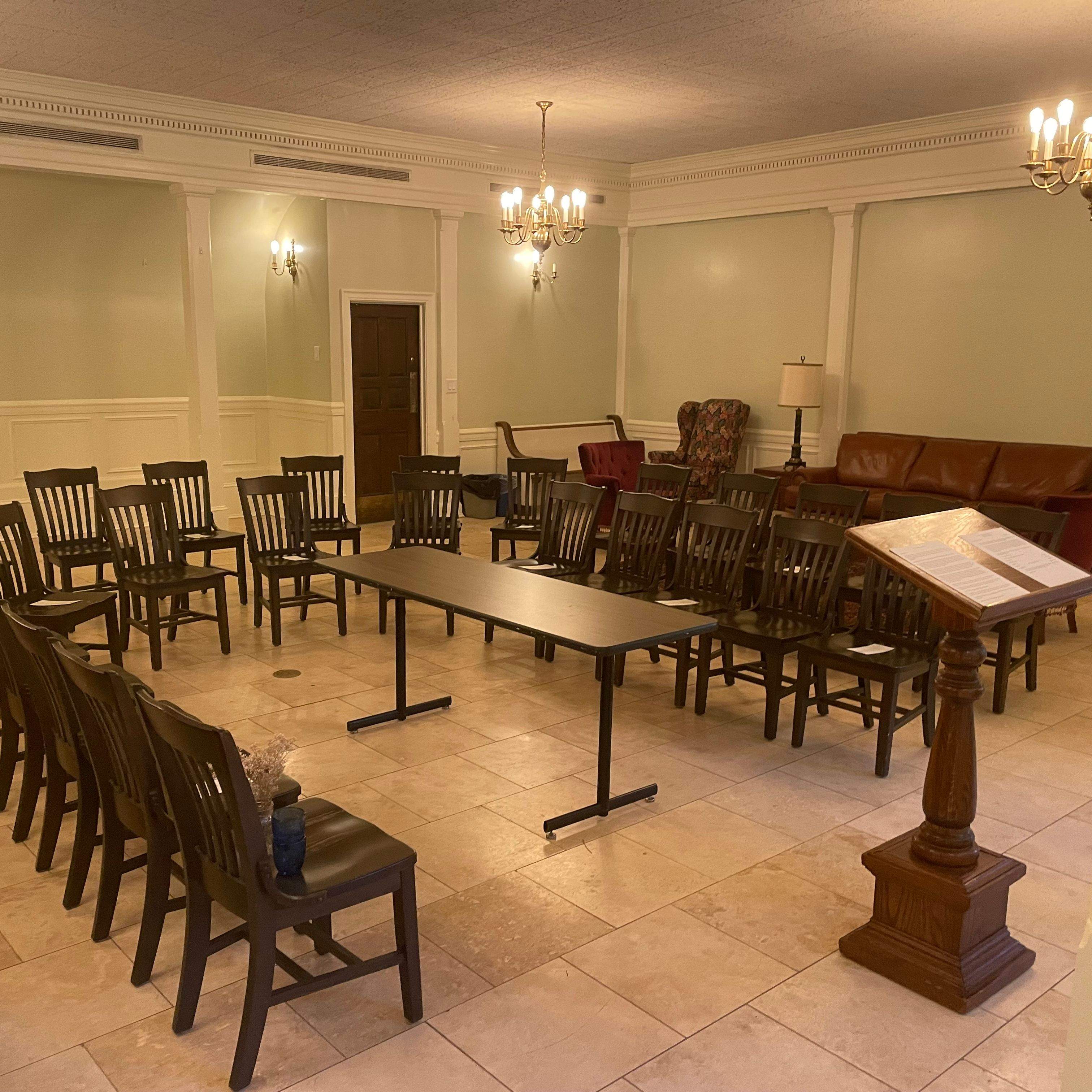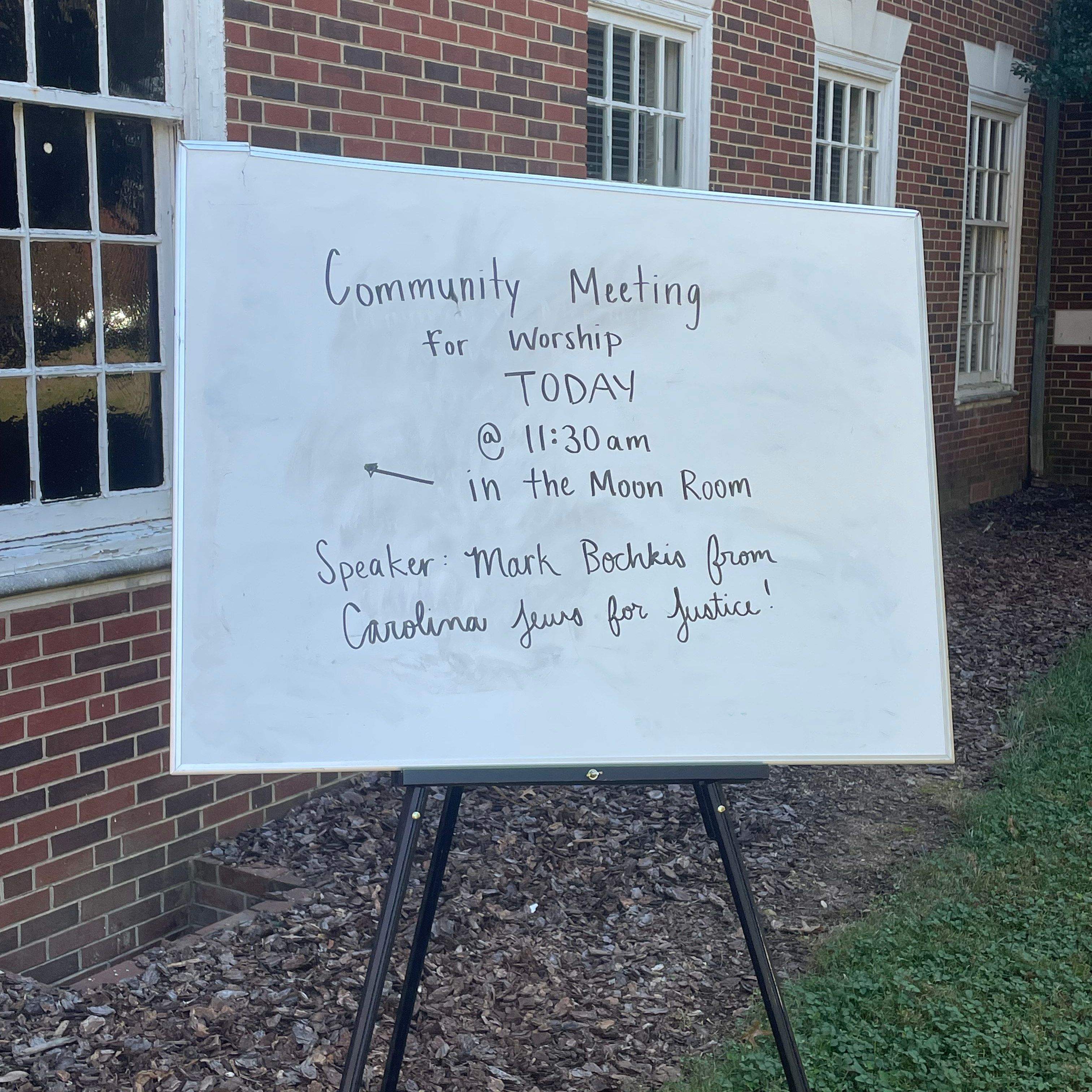Oct 27, 2024
Community, Belonging and 10/7
Community Meeting for Worship, Guilford College, October 25, 2024
Good morning,
Thank you for allowing me to share some of my thoughts and feelings today. My name is Mark Bochkis, and, as my bio said, I am an organizer and communications director with Carolina Jews for Justice, a statewide organization of progressive Jews aligned around the values of truth, peace and social justice.
However, I’d like to start off today by telling you a little bit more about myself and my family.
We came to GSO from Moldova in 1991 thanks to a resettlement program organized and funded by the Greensboro Jewish community. My mom later worked for the GSO Jewish Fed for a number of years helping to run the same resettlement program that brought us here. I am always proud to bring up my mom’s efforts - but today is an especially meaningful time for me to mention her, as yesterday was her yartzeit, or the anniversary of her passing.
I’ll also lovingly say that while my mom held the title of Resettlement Coordinator, it was really our whole family’s business. We moved furniture from Fed warehouses to expectant arrivals' apartments, greeted people at the airport when they came off the plane, took folks to the DMV to “translate” driving tests. My dad helped people buy cars and taught them how to invest in real estate.
In those early years, in the 90s, my family quickly became a part of this community. We worked for our place in it. At various points, we all took our turns happily fulfilling expectations as representatives of the resettled “Russian” community. My dad has shared our story publicly a number of times over my family’s nearly 35 years here in Greensboro. I have also been honored to share the stage at a few Federation annual kickoffs, helping to raise money for the Federation’s good causes using my family history.
My family loves our community. This community, which took us in at our most vulnerable, when we were at our most in-need. We have honored our debts to it. We treasure our place in it.
But this community is not perfect. No community ever is. Because no person ever is. I am certainly nowhere near perfection. I am, in fact, a big ole mess of humanity right now, at this time.
I want to tell you a little bit more about that messiness.
I am a father to two wonderful little girls. Mia and Emma are my world - they are the best things I’ve ever done. But, right now, Mia and Emma’s family is going through a painful, messy divorce.
My daughters also attend B’nai Shalom Day School, the same school I went to when my family came here in 1991.
B’nai is a wonderful school. But B’nai is also not perfect.
I know, because I experienced a few of these imperfections, personally, as a student.
B’nai is supported by many of the same families that helped fund the resettlement program. And many kids from these families attended B’nai with me.
A number of my more-privileged classmates found it funny to see me wear their donated clothes from the previous school year. Some of them let me know about it. A few encouraged me to “go back to Russia.”
Kids are honest. A lot more honest than adults tend to be. I attended B’nai for two years, and for two years I endured near-daily ridicule about my foreign-ness.
Near the end of my tenure at B’nai I summoned the courage to stand up for myself. I confronted the ringleader of my fan club, using what I had at my disposal - my body and my imperfect English - to let him know that the abuse was not going to go unchallenged any more.
From then on, things got a little bit easier. Not perfect. But better.
B’nai’s imperfections were hurtful to me as a child. Regrettably, they continue to hurt as an adult, too.
One of the expectations of a resettled Jewish family in Greensboro is that the children will attend the Jewish day school. This expectation now extends to my children. However, my standing - as a parent, as a father, as a member of the B’nai community - has slowly eroded over the last couple of years, coinciding with my divorce from one of the heralded families of the Greensboro Jewish community.
My acceptance into the B’nai community has also been challenged as I’ve expressed reservations about continuing to send my kids to a communal environment that feels increasingly inhospitable, if not outright hostile, to my presence. It seems B’nai wants my children, but very much doesn’t want me.
A lot of this messiness came to a head on October 7 of this year - an emotional day in its own right. On this day, I wore a T-shirt with a Palestinian flag and the message “to stand with Palestine is to stand with humanity” to the drop-off line at B’nai.
In the days before, I’d communicated by email w/school officials about the language used to announce an October 7 program for students - a Havdalah service, followed by poster-making with words of encouragement for Israel. The email announcing the program stated that, as a Jewish day school, B’nai would stand with Israel.
I raised concerns about the appropriateness of including political language and presenting slanted framing on a complicated geopolitical situation for an event intended as a commemorative program to honor traumatized people. The response I received was professional in tone and dismissive in content.
The shirt I wore was in protest to the lack of interest to engage shown by school administrators. Unfortunately, by the morning of October 7, 2024, this pattern of behavior felt all too familiar to me.
I went home. Took my 3-year old puppy, Bodie, for a walk. And stewed. The shirt wasn’t enough. I wanted to make B’nai administrators deal with the issue. I wanted their attention on it.
So, of course, I made a social media post, tagging B’nai and putting the school on blast for everyone to see. If I can’t make them talk to me, I thought, maybe they’ll have to talk to someone else.
I know. Not good! It was soooooo not good!!!
The firestorm that ensued was epic! I mean, people lost their freakin minds, y’all. The vitriolic responses came immediately. Fast and furious. And on that day, in that post, I saw a familiar message from the gilded class of the Greensboro Jewish community: “Go back to Moldova”!
I joked in a response comment that, in 30 years, at least they learned the difference in geography between Russia and Moldova. Despite the humor, that barb stung. It still does.
As much as it hurts, this moment deserves attention. In this rare, honest, transparent moment, my community publicly showed its xenophobia, its reflexive willingness to label one of its own “the other” and its propensity for aggressively defensive overreaction to a perceived (not an actual) threat.
The deeply imperfect, angry and cruel nature of our humanity was on full display that day - I’m describing myself here, along with the half dozen or so prolific posters. But, on that same day, the beautiful, vulnerable, curious and open-minded nature of our culture was also being woven into existence.
At the same time as the drama was beginning to unfold on Facebook, I was facilitating a virtual care space for Jews in North Carolina who had no other place to be, no community to be a part of, on October 7. For two hours, we took turns sharing our experiences and processing our emotions as progressive Jews in the midst of the deadliest eruption of Israeli/Palestinian violence we’ve witnessed since… maybe, ever.
It was an open, honest and challenging series of conversations, and it was beautiful to behold.
The most meaningful part of the facilitation came when a retirement-age participant initiated a discussion about the keffiyeh, a cultural Palestinian headscarf. The caller shared that he always felt intimidated and attacked whenever he saw a protestor or a pro-Palestinian advocate wearing a keffiyeh. He confided that he thought it was worn in solidarity with violent resistance. This part was not so unusual.
Here’s the part that is: the man remained open and receptive to feedback as other participants caringly updated his knowledge of what the keffiyeh is and what it represents - a Palestinian nation, not violent resistance.
The man remained engaged and expressed genuine appreciation to the group for improving his understanding of an element that had always sparked defensiveness and kicked in his tribal instinct.
This felt big! This also is a moment deserving to be examined and upheld.
There is hope in this moment. There is power in this moment. There is opportunity.
This moment that I had a hand in creating stands in stark contrast to the chaos parallel reality that I also helped spark on Facebook - chaos for which I should and have apologized.
Here’s what I take away from these wildly contrasting, concurrent events:
I very much want to create more of these keffiyeh - aha! moments. I believe it is these moments that are most needed for our community, for our people, to move past the shadow of the Holocaust. In order for us to relinquish the traumatized victim mindset that plagues us - in our families, in our day schools, in our businesses, in our institutions and, yes, in our nationhood.
Traumatized people rarely make good decisions. But we, as a people, refuse to let go of the trauma.
How do we let go?
When I started working at Carolina Jews for Justice this June, my boss, Abby, gave me a whole bunch of reading, including a book called Safety Through Solidarity: A Radical Guide to Fighting Antisemitism. At the root, the concept actually isn’t all that radical. The basic premise is this: Jews are safest when marginalized communities around us are also safe.
How do we let go of persistent, multi-generational trauma? With help. With hope. With therapy.
We need the therapy of good, honest friends. We need the therapy of uncomfortable, hard truths. We need the therapy of solidarity and social justice.
Which brings me back to my Facebook post. That post was absolutely not therapy - it was more trauma. As I come before you itching to create a better version of our current world, I need to own my own destructive actions.
I made a number of critical errors in letting that Facebook post fly.
First, putting the phone number and email address was a huge unforced error. No one actually interested in connecting with B’nai on that issue (or any other) needed that information from me. Instead of inspiring supporters, my call to action put staff and parents (potential allies) on the defensive. Some of them actually went into attack mode themselves.
This also hurts to admit, but I heard from or about a number of school parents who felt their sense of safety violated that day due to my actions. We can argue about whether that reaction is warranted or not, but I absolutely owe those parents and B’nai staff an apology for creating an atmosphere of unease.
Secondly, I let my anger take over at the switchboard while I was social media-ing. For all the young students and aspiring activists here today, please hear me: DO NOT SOCIAL MEDIA WHILE ANGRY. This isn’t a lesson an experienced communications professional should be learning so publicly… but, regardless: please, learn from my mistakes.
Lastly, perhaps my biggest mistake was going at it alone. In the days after the post, a community stood up around me: to support me, and also lovingly, caringly tell me where I F’ed up, and what I could do to mitigate the damage.
But that community came around me in an emergency fashion. I didn’t activate that community intentionally or in advance - they responded on their own initiative, and at a time not of their choosing. I owe my community a hearty thank you and also a sincere apology.
The big lesson for me in all this is the responsibility of actually being in community. That’s something that I may not be as good at as I think, perhaps. At the very least, it’s something that I need to continue to work at. I also continue to hope that the good folks over at B’nai will engage with me, in good faith, in those efforts.
Thank you guys very much for letting me ramble for this long.
